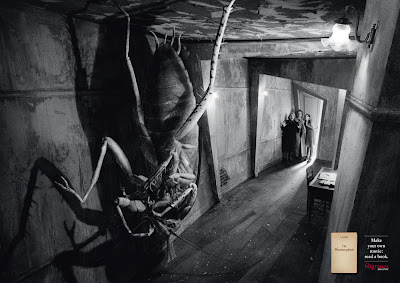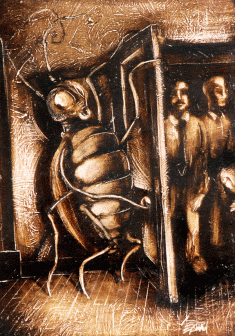Gregor
encountered a lot of physical ordeals with his transformed body. But the movie differed
greatly from the story on the aspects of Gregor’s ordeals, even though the similarities
between the two versions are few. For example, based on Gregor’s communication
ordeal the actual story portrayed Gregor to sound like an insect in his response
to his parents when he was called to attend to his boss. Likewise in the movie,
there was no scene about Gregor’s words to his parents or his boss. The movie
represented Grogor as a man who could not speak because of his half insect and
half human transformed mouth. According to Breckman, Gregor’s inability to
speak was as a result of his detachment from humanity that occurred through his
metamorphosis. Based on Gregor’s eating ordeal, the story presented him as one
who could not eat because of his insect mouth; as a result, he dunked his head
in milk nearly up to his eyes (Kafka 342). Likewise in the movie, Gregor fed
himself with the use of his huge insect mandible while littering some of his
food on the floor. However, both the story and the movie were similar on the
aspect that Gregor ate rotten food, which was given to him by his sister.
Moreover, the differences between the actual story and the movie lie in the psychological ordeals of Gregor’s transformation. His psychological ordeals were because of his ceaseless human thought as an insect. Gregor’s mind was never at rest, and this also contributed to his inability to sleep. According to the story, Gregor thought silently, “What has happened to me?” Kafka (335). He did not understood what happened to him over night, and that was why he pondered in his thoughts. Likewise, the movie did not represent any scene on Gregor’s thoughts about his condition. The story also presented Gregor’s thought’s about his job. For example, he said silently, “Before it strikes seven-fifteen, I must without fail be completely out of bed. For one thing, someone from the company will have to come by then to inquire on me because the office opens before seven” (Kafka 337). This shows that Gregor still had much concerned for his job and his company despite his condition. Likewise, the movie did not represent any thoughts of Gregor about his company or his job. However, the movie and the story had similarities based on Gregor’s action when he opened the door to talk to his boss. This was because Gregor realized that his boss was angry with him, and he threatened Gregor’s job position in the company. Gregor did not want to lose his job because of his responsibilities to his family, especially his father’s debts. According to Breckman, Gregor’s father’s debt contributed to his loss of humanity. This shows that Gregor’s mind was never at peace because he was too worried about his family’s financial condition.

Furthermore, the movie and the story had some similarities about the cause of Gregor’s death. Gregor’s psychological trauma caused by his father’s hostility led to his early death. According to the story, Gregor was unhappy with his family’s decision to get rid of him, and this greatly contributed to his death (Kafka 354). Likewise, the movie also represented a scene on his family’s anger to get rid of him when he scared the German visitors. Thus, he had no other choice, but to die and free his mind from more misery. Based on Gregor’s death location, the story represented that he died in his room, and he was discovered by the house servant. While in the movie, Gregor died in his home library, and the German visitors found him lying dead. Gregor’s unstable mind and his father’s hostility towards him greatly contributed to his early death.
Gregor’s
dehumanization really affected his parents emotionally throughout the story and
the movie. Hence, the story and the movie had more similarities than differences
on the emotional reactions of Gregor’s parents. For example, the movie represented
a scene where Gregor’s angry father struck him with apples, and this was also
presented in the story. But the difference between the two versions was based on
the fact that in the story, Gregor’s father hit him with apples in the kitchen,
while in the movie the scene took place out of the house. Another similarity was
when Gregor’s father chased him with the deputy’s director’s walking stick, which
the movie also represented. Gregor’s mother often attempted to collapse because
of Gregor’s condition, and this aspect in the story was also represented in the
movie. For example, she insisted on her daughter to take her to Gregor’s room,
and each time she saw Gregor her mind and body got weak. However, though the
family had bad emotional times, they were happy at one point because of Gregor’s
death. The movie and the story had similarities on
this aspect by showing how relief the family felt with the news of Gregor’s
death. In the movie, Gregor’s family
took a walk along the beach, while in the story they rested and took a stroll (Kafka
356). The saddest thing and a great similarity between the story and the movie
was based on the fact that there was no incident of Gregor’s parent’s regret for
their son’s death, or any moment of silent to pay him the last respect.
Carlos’ movie was really great, even though it cannot be compared with the story in terms of Kafka description of Gregor. This is because Carlos did not concentrate on the important aspects of Gregor’s physical challenges, which include his communication, eating, and sleeping. In addition, there were no scenes in the movie about Gregor’s psychological thoughts of his life and his job. Nonetheless, there were some similarities between the movie and the story based on the emotional stress of Gregor’s family and their reaction towards Gregor. Above all, the movie was a great representation of Kafka’s story because it tried in the representation of what Gregor looked like and it also gave a better understanding of the story.
Work Cited
Breckman, Warren. “Kafka’s Metamorphosis in his time and ours.”
Penn Reading Project.
Web. 21 May.2012.
Sokel, Walter H. “Kafka’s Metamorphosis: “Rebellion and
Punishments. The University of
Wisconsin Press. Web. 21
May. 2012
Chenoweth, Rebecca. “The threat of sleep in metamorphosis.” A
Journal of Undergraduate
Literary
Criticism and Creative Research 1.1(2010). Web. 21 May 2012.











